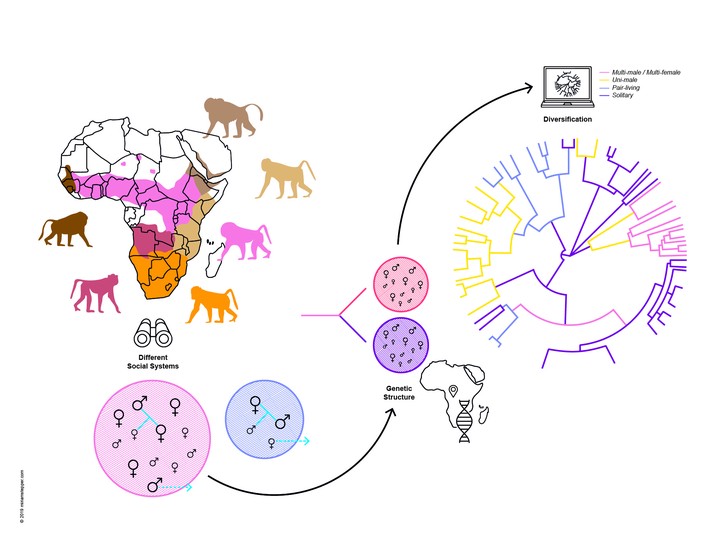To complete the investigation of the role of social system variation in macroevolution, I will directly examine the influence of social system traits on diversification processes. Triggered by the increasing availability of genetic data over the whole tree of life, the last years have brought a tremendous advance in methodologies to explain and understand diversification processes. Novel algorithms now allow us to reconstruct the variation of speciation and extinction rates over evolutionary time and to elucidate the underlying causes. Finding spurious correlations when estimating trait-dependent diversification rates could be a particular problem when analysing behavioural traits, as behavioural variables are often correlated among each other and with ecological ones. Lately, a new algorithm has been developed that can potentially solve this problem by accountingfor the presence of unmeasured “hidden” factors. I will apply this method to investigate the evolutionary consequences of social system variation in primates, because their behavioural diversity allows me to address different hypotheses about the correlation of behavioural traits and diversification. There are currently 470 primate species recognized including both single-species and very species-rich genera and clade diversity is heterogeneous across the primate phylogeny. Primate social systems are arguably the best investigated among mammals. All three components of the social system show extreme diversity in primates: social organisation ranges from solitary to pair- and group living, with the latter being the most prevalent. Mating systems include monogamy, polyandry, and various forms of polygyny and polygynandry. Finally, social interactions and relationships among individuals (social structure) range from affiliative to agonistic and from long-lasting to ephemeral. Dispersal patterns have important repercussions for all three components and, while male-biased dispersal is the most common pattern, female-biased dispersal and dispersal by both sexes also exists. There is some evidence that the social system has an influence of diversification rates in primates but detailed analysis that go beyond binary trait classifications are lacking. I will compile a dataset on key aspects of social systems of primates from published data. Especially variation in spatio-temporal grouping patterns and dispersal behaviours can be expected to profoundly impact genetic diversity and evolutionary processes, such as local adaptation and genetic differentiation through their impacts on gene flow and effective population size. Phylogenetic relationships will be incorporated based on the continuously updated time-calibrated species-level phylogeny of mammals. This line of research is set out as a first exploratory assessment of the evolutionary consequences of behavioural variation. It will commence consciously oversimplified but will incorporate the results from the other project parts and build the foundation for subsequent, more nuanced studies. By formulating an explicit framework and addressing all the links within, my research project will result in a better understanding of the role of interspecific behavioural differences in population dynamics and speciation processes. The force of behavioural variation in macroevolution has been largely ignored and its appreciation will serve as a substantial complement to classical views on the causes of speciation. This will constitute an essential step towards understanding the complex interplay between ecology, social behaviour, and adaptive evolution and the underlying genomic processes.
Building an integrative framework of behavioural variation in a macroevolutionary context
